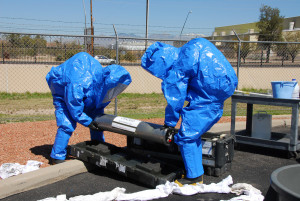 Environmental health is a vital field that features a diverse list of career opportunities. Not only can working in this field enable you to make the world a cleaner and healthier place but you can also earn a good living. In fact, according to the Bureau of Labor Statistics, environmental health professionals can make as much as $102,610 per year. With this in mind, it makes sense to carefully consider environmental health as a career path.
Environmental health is a vital field that features a diverse list of career opportunities. Not only can working in this field enable you to make the world a cleaner and healthier place but you can also earn a good living. In fact, according to the Bureau of Labor Statistics, environmental health professionals can make as much as $102,610 per year. With this in mind, it makes sense to carefully consider environmental health as a career path.
Five of the Most Important Environmental Health Jobs
1. Emergency Response Specialist
Unfortunately, environmental emergencies happen more frequently than most people would like to admit. When something goes wrong, it is critical for trained environmental health professionals to be available as part of the emergency response team.
An individual who specializes in emergency responses is responsible for organizing the cleanup of hazardous materials. This important position also fulfills the role of communicating about environmental issues with local residents and the media. Additionally, emergency response specialists investigate the cause of each spill.
2. Air Pollution Specialist
More than 40 percent of U.S. residents are exposed to high levels of air pollution on a daily basis. This problem can become exacerbated by an environmental disaster. Therefore, air pollution specialists work to ensure that all applicable regulations are being adhered to within their target area. When a violation is discovered, an air pollution specialist has the power to issue citations. These environmental health professionals also perform inspections and monitor the overall air quality.
3. Hazardous Waste Specialist
Hazardous waste that is released into the environment, whether intentionally or accidentally, has the potential to greatly harm humans and wildlife. Hazardous waste specialists work closely with the manufacturers and users of these materials to ensure that violations do not occur. Inspections and public education campaigns help keep everyone safe. However, these specialists follow-up on each complaint when a company is suspected of not properly storing or disposing of hazardous waste. If legal action is warranted, a hazardous waste specialist will also assist with state and federal prosecution efforts.
4. Toxicologist
Toxicologists serve a critical role in environmental health because they study the impact of radiation and other toxins on all types of living organisms. In other words, a toxicologist helps determine how detrimental each toxin actually is. These professionals are tasked with figuring out how these risks can be reduced or completely eliminated.
People who become toxicologists will perform experiments in real world and lab settings. It is also necessary to write scientific papers and advise regulatory agencies. In other words, toxicologists can provide regulatory agencies with all of the data that is needed to pass life-saving guidelines.
5. Drinking Water and Ground Water Specialists
Water oversight is a hot button topic right now due to the lead poisoning that has afflicted residents in Flint, Michigan. Individuals who work as drinking water and ground water specialists can help prevent future environmental and public health disasters of this nature. These professionals examine water resources to make sure that they are safe for public consumption, and they also manage any nearby threats that could eventually pose a health risk. For example, if there is a landfill nearby, a drinking water and ground water specialist will perform inspections and tests to verify that water sources are not becoming contaminated.
As you can see, the environment would be in much worse shape if people were not filling important roles in the environmental health industry. Working in this field makes it possible to improve local conditions and hold corporations responsible for their actions.